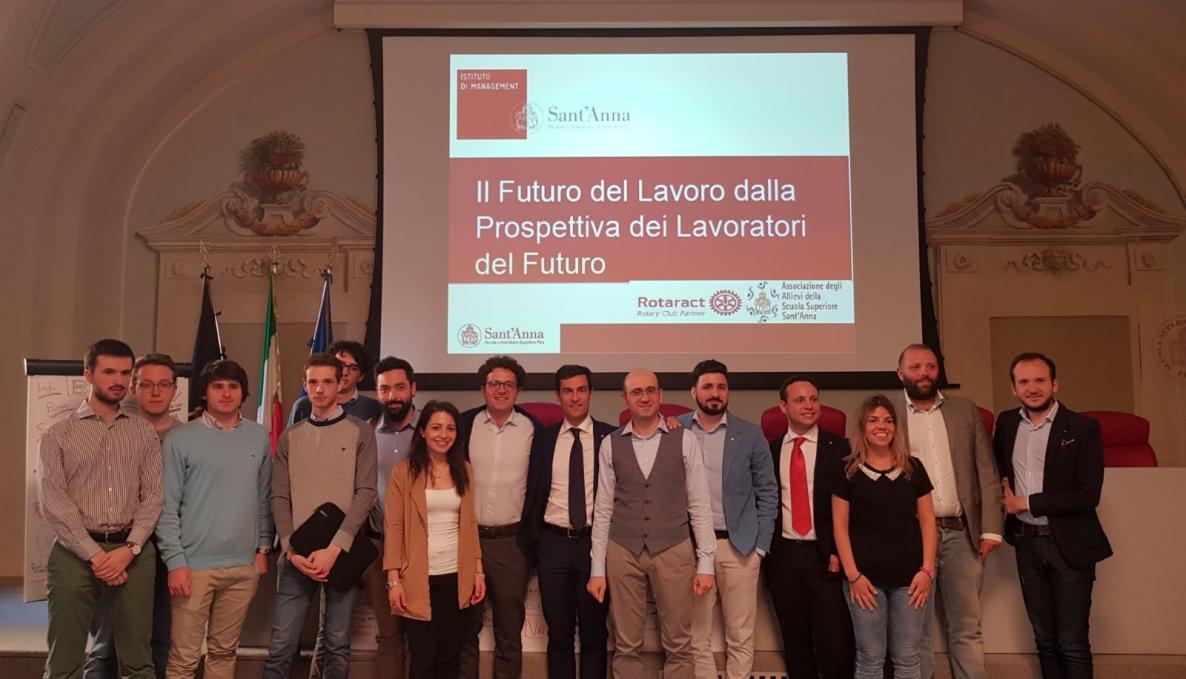THE FUTURE OF WORK FROM THE FUTURE EMPLOYEES’ PERSPECTIVE: SANT’ANNA SCHOOL STUDENTS AND TUSCANY ROTARACT MEMBERS DISCUSS EMPLOYMENT TRENDS AND SMART MANAGEMENT

Professor Alberto Di Minin of the Institute of Management at Sant’Anna School has organized a conference to discuss upcoming disruptions to the employment landscape. Sant’Anna School students, young professionals, professor Di Minin and Giulio Ferrigno, Research Fellow at Sant’Anna School Institute of Management together with Tuscany Rotaract members from Distretto Rotaract 2071 participated in the conference on the profound changes in the world of work driven by globalization and technological innovation.
Over the past decade, in addition to the quantity of jobs, we have witnessed disruptive changes to industries and business models affecting the skills requirements and content of many jobs. Overall, there are widespread concerns regarding the impact of these social and economic transformations. The strongest employment growth is expected to come from artificial intelligence, machine learning, robotics, Industry 4.0 and the application of Big Data analytics. Similarly, there will be a fast-growing need for skilled technicians and specialists to create and manage advanced and automated production systems.
More than 40 people attended the event. It was divided into eight sessions focused on the Sole 24 Ore newspaper articles published in 2017, as follows:
- La svolta hi-tech cambia il mercato del lavoro, Francesca Barbieri, 18 Dicembre 2017;
- Ora i robot insidiano anche le professioni, Marco Magnani, 3 Dicembre 2017;
- Creatività, una competenza di cui non potremo più fare a meno, Francesca Contardi, 1 Dicembre 2017;
- Multinazionali sulla via del ritorno, Laura Cavestri, 7 Ottobre 2016;
- Cogito, ergo capisco come voi umani, Luca De Biase, 27 Agosto 2017;
- Dagli avvocati ai notai, perché l’intelligenza artificiale cambierà la vita dei professionisti, Alberto Magnani, 23 Ottobre 2017;
- Come cambia il lavoro in banca nell’era digitale, meno occupati e più donne, Nicola Barone, 18 Dicembre 2017;
- Se il digitale è al servizio del «fatto bene», Luca De Biase, 12 Novembre 2017.
The goal of these interactive discussions was to contribute to the Future of Work initiative from the young workers’ perspective and debating possible education responses as a means to provide opportunities in a range of job categories: traditional roles (employee, shop assistant, cook and waiter, nursing professional, technician), newly emerging roles (blockchain and privacy specialist, artificial intelligence expert, digital media specialist) and the “most difficult to find” technicians in ICT, physics, chemistry and engineering.
Other specialties mentioned included new office roles for automated work processes. A particular need is seen in industries and companies for highly skilled (hard and soft skills) managers who will work through the upcoming change with curiosity, open mindedness, emotional intelligence, adaptability and creativity.
Along the sale line, the financial and legal services sector will also undergo a significant shift, with employment growth for data analysis and information security professionals. One thing seems certain - we can expect a decrease in demand for traditional roles.



